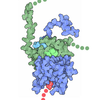[English] 日本語
 Yorodumi
Yorodumi- PDB-3cvp: Structure of Peroxisomal Targeting Signal 1 (PTS1) binding domain... -
+ Open data
Open data
- Basic information
Basic information
| Entry | Database: PDB / ID: 3cvp | ||||||
|---|---|---|---|---|---|---|---|
| Title | Structure of Peroxisomal Targeting Signal 1 (PTS1) binding domain of Trypanosoma brucei Peroxin 5 (TbPEX5)complexed to PTS1 peptide (10-SKL) | ||||||
 Components Components |
| ||||||
 Keywords Keywords | TRANSPORT PROTEIN / TPR motifs / TPR protein / Peroxin 5 / PEX5 / PTS1 binding domain / Protein-peptide complex / Receptor / TPR repeat | ||||||
| Function / homology |  Function and homology information Function and homology informationperoxisome matrix targeting signal-1 binding / protein import into peroxisome matrix, docking / peroxisomal membrane / metal ion binding / cytosol / cytoplasm Similarity search - Function | ||||||
| Biological species |  | ||||||
| Method |  X-RAY DIFFRACTION / X-RAY DIFFRACTION /  MOLECULAR REPLACEMENT / Resolution: 2 Å MOLECULAR REPLACEMENT / Resolution: 2 Å | ||||||
 Authors Authors | Sampathkumar, P. / Roach, C. / Michels, P.A.M. / Hol, W.G.J. | ||||||
 Citation Citation |  Journal: J.Mol.Biol. / Year: 2008 Journal: J.Mol.Biol. / Year: 2008Title: Structural Insights into the recognition of peroxisomal targeting signal 1 by Trypanosoma brucei peroxin 5. Authors: Sampathkumar, P. / Roach, C. / Michels, P.A. / Hol, W.G. | ||||||
| History |
|
- Structure visualization
Structure visualization
| Structure viewer | Molecule:  Molmil Molmil Jmol/JSmol Jmol/JSmol |
|---|
- Downloads & links
Downloads & links
- Download
Download
| PDBx/mmCIF format |  3cvp.cif.gz 3cvp.cif.gz | 70.3 KB | Display |  PDBx/mmCIF format PDBx/mmCIF format |
|---|---|---|---|---|
| PDB format |  pdb3cvp.ent.gz pdb3cvp.ent.gz | 50.3 KB | Display |  PDB format PDB format |
| PDBx/mmJSON format |  3cvp.json.gz 3cvp.json.gz | Tree view |  PDBx/mmJSON format PDBx/mmJSON format | |
| Others |  Other downloads Other downloads |
-Validation report
| Summary document |  3cvp_validation.pdf.gz 3cvp_validation.pdf.gz | 426.1 KB | Display |  wwPDB validaton report wwPDB validaton report |
|---|---|---|---|---|
| Full document |  3cvp_full_validation.pdf.gz 3cvp_full_validation.pdf.gz | 427.8 KB | Display | |
| Data in XML |  3cvp_validation.xml.gz 3cvp_validation.xml.gz | 12.6 KB | Display | |
| Data in CIF |  3cvp_validation.cif.gz 3cvp_validation.cif.gz | 17.3 KB | Display | |
| Arichive directory |  https://data.pdbj.org/pub/pdb/validation_reports/cv/3cvp https://data.pdbj.org/pub/pdb/validation_reports/cv/3cvp ftp://data.pdbj.org/pub/pdb/validation_reports/cv/3cvp ftp://data.pdbj.org/pub/pdb/validation_reports/cv/3cvp | HTTPS FTP |
-Related structure data
| Related structure data |  3cv0C  3cvlC 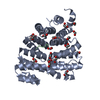 3cvnC 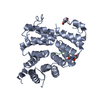 3cvqC  1fchS C: citing same article ( S: Starting model for refinement |
|---|---|
| Similar structure data |
- Links
Links
- Assembly
Assembly
| Deposited unit | 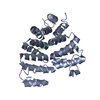
| ||||||||
|---|---|---|---|---|---|---|---|---|---|
| 1 |
| ||||||||
| Unit cell |
| ||||||||
| Details | THE BIOLOGICAL UNIT OF PROTEIN PEX5 IS MONOMER |
- Components
Components
| #1: Protein | Mass: 36545.844 Da / Num. of mol.: 1 Fragment: Peroxisomal Targeting Singal 1 (PTS1) binding domain of TbPEX5 Mutation: K378A/E379A Source method: isolated from a genetically manipulated source Source: (gene. exp.)   |
|---|---|
| #2: Protein/peptide | Mass: 1048.196 Da / Num. of mol.: 1 / Source method: obtained synthetically |
| #3: Water | ChemComp-HOH / |
-Experimental details
-Experiment
| Experiment | Method:  X-RAY DIFFRACTION / Number of used crystals: 1 X-RAY DIFFRACTION / Number of used crystals: 1 |
|---|
- Sample preparation
Sample preparation
| Crystal | Density Matthews: 2 Å3/Da / Density % sol: 38.62 % |
|---|---|
| Crystal grow | Temperature: 298 K / Method: vapor diffusion, sitting drop Details: 2.3M Potassium acetate, 0.1M sodium citrate monohydrate, pH 4.8 - 5.0, vapor diffusion, sitting drop, temperature 298K PH range: 4.8 - 5.0 |
-Data collection
| Diffraction | Mean temperature: 100 K |
|---|---|
| Diffraction source | Source:  ROTATING ANODE / Type: RIGAKU MICROMAX-007 HF / Wavelength: 1.5418 Å ROTATING ANODE / Type: RIGAKU MICROMAX-007 HF / Wavelength: 1.5418 Å |
| Detector | Type: RIGAKU SATURN 944 / Detector: CCD / Date: Aug 28, 2006 / Details: Osmic VariMax |
| Radiation | Protocol: SINGLE WAVELENGTH / Scattering type: x-ray |
| Radiation wavelength | Wavelength: 1.5418 Å / Relative weight: 1 |
| Reflection | Resolution: 2→32.95 Å / Num. all: 19960 / Num. obs: 19221 / % possible obs: 96.3 % / Observed criterion σ(I): 3 / Redundancy: 2.71 % / Biso Wilson estimate: 29.14 Å2 / Rsym value: 0.06 / Net I/σ(I): 11.1 |
| Reflection shell | Resolution: 2→2.07 Å / Redundancy: 1.82 % / Mean I/σ(I) obs: 2.5 / Num. unique all: 1982 / Rsym value: 0.311 / % possible all: 79.1 |
- Processing
Processing
| Software |
| ||||||||||||||||||||||||||||||||||||||||||||||||||||||||||||||||||||||||||||||||||||||||||
|---|---|---|---|---|---|---|---|---|---|---|---|---|---|---|---|---|---|---|---|---|---|---|---|---|---|---|---|---|---|---|---|---|---|---|---|---|---|---|---|---|---|---|---|---|---|---|---|---|---|---|---|---|---|---|---|---|---|---|---|---|---|---|---|---|---|---|---|---|---|---|---|---|---|---|---|---|---|---|---|---|---|---|---|---|---|---|---|---|---|---|---|
| Refinement | Method to determine structure:  MOLECULAR REPLACEMENT MOLECULAR REPLACEMENTStarting model: PDB code 1FCH Resolution: 2→32.95 Å / Cor.coef. Fo:Fc: 0.941 / Cor.coef. Fo:Fc free: 0.915 / SU B: 4.834 / SU ML: 0.136 / Isotropic thermal model: Isotropic / Cross valid method: THROUGHOUT / σ(F): 0 / ESU R: 0.219 / ESU R Free: 0.188 Stereochemistry target values: MAXIMUM LIKELIHOOD WITH PHASES
| ||||||||||||||||||||||||||||||||||||||||||||||||||||||||||||||||||||||||||||||||||||||||||
| Solvent computation | Ion probe radii: 0.8 Å / Shrinkage radii: 0.8 Å / VDW probe radii: 1.4 Å / Solvent model: BABINET MODEL WITH MASK | ||||||||||||||||||||||||||||||||||||||||||||||||||||||||||||||||||||||||||||||||||||||||||
| Displacement parameters | Biso mean: 34.05 Å2
| ||||||||||||||||||||||||||||||||||||||||||||||||||||||||||||||||||||||||||||||||||||||||||
| Refinement step | Cycle: LAST / Resolution: 2→32.95 Å
| ||||||||||||||||||||||||||||||||||||||||||||||||||||||||||||||||||||||||||||||||||||||||||
| Refine LS restraints |
| ||||||||||||||||||||||||||||||||||||||||||||||||||||||||||||||||||||||||||||||||||||||||||
| LS refinement shell | Resolution: 2→2.052 Å / Total num. of bins used: 20
|
 Movie
Movie Controller
Controller


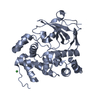
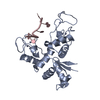
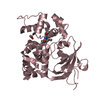
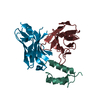

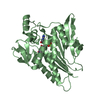

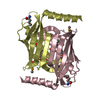
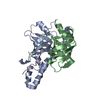

 PDBj
PDBj
